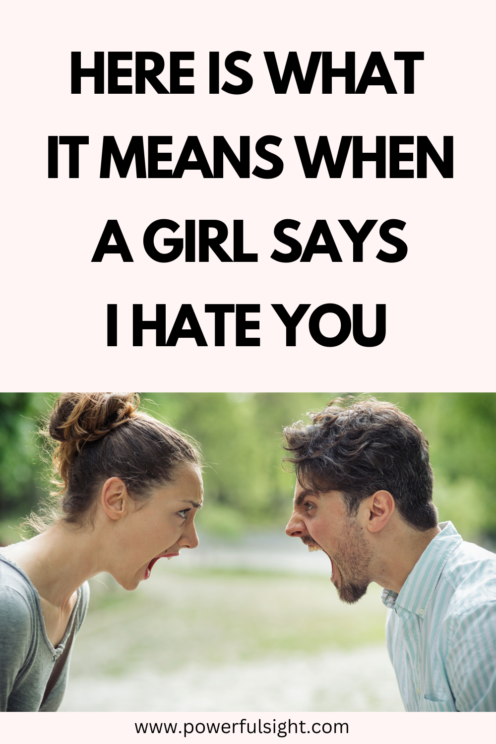When a girl says “I hate you,” it can be a confusing and emotionally charged statement.
The context and the relationship between the two individuals play a crucial role in understanding the true meaning behind these words.
Today, I will be sharing with you, 6 possible meanings to the statement I hate you, especially if it was said by your girlfriend.
Communication Style Differences Between Men and Women
It is well-established that men and women often have distinct communication styles. While men tend to be more direct and literal in their speech, women may use more indirect and emotionally expressive language. This difference in communication patterns can lead to misunderstandings, especially when it comes to the use of strong phrases like “I hate you.”
Related: How to make a girl trust you
The Power of Words: Analyzing the Phrase “I Hate You”
The phrase “I hate you” is a powerful statement that carries a significant emotional weight.
In the context of a relationship, these words can be interpreted as a sign of deep-seated anger, resentment, or even the desire to end the relationship altogether. However, it is important to recognize that the true meaning behind these words may not always be as straightforward as they appear.
Related: How to make a girl feel safe
What It Means When a girl says I hate you
- Emotional Outburst: Sometimes, the phrase “I hate you” can be an impulsive reaction to a specific situation or conflict, rather than a reflection of the person’s genuine feelings. In the heat of the moment, individuals may say things they do not truly mean.
- Cry for Attention: For some individuals, using strong language like “I hate you” may be a way to seek attention or elicit a response from the other person. This can be a sign of an underlying need for validation or emotional connection.
- Exaggerated Expression: In certain cultural or social contexts, the phrase “I hate you” may be used as an exaggerated form of expression, without necessarily implying a deep-seated hatred. It can be a way of emphasizing a strong dislike or disagreement.
- Unresolved Conflicts: If the relationship has a history of unresolved conflicts or underlying tensions, the use of “I hate you” may be a manifestation of these deeper issues. It could be a way for the person to express their frustration or a desire to address the root causes of the problems.
- Passive-Aggressive Behavior: In some cases, the phrase “I hate you” may be a form of passive-aggressive behavior, where the person is indirectly expressing their displeasure or resentment without directly addressing the problem.
- Genuine Dislike: In rare instances, the phrase “I hate you” may reflect a genuine and deep-seated dislike or hatred towards the other person. This could be the result of a severe breach of trust, a traumatic event, or an irreconcilable difference in values or beliefs.
Emotional Reaction vs. Genuine Dislike
It is important to distinguish between an emotional reaction and a genuine, long-lasting dislike. The former may be a temporary outburst, while the latter indicates a more profound and enduring negative sentiment. Understanding this distinction can help individuals navigate the complexities of the situation and respond appropriately.
Conclusion
In conclusion, the phrase “I hate you” can have multiple meanings and implications, depending on the context, the relationship dynamics, and the individuals involved.
Save the pin for later

- 9 Things Daughters Of Narcissistic Mothers Don’t Do - 02/03/2026
- Daughters of Narcissistic Mothers Healing Affirmations - 27/02/2026
- 5 Perfect Mother’s Day Gift Ideas (That She’ll Truly Love) - 27/02/2026
